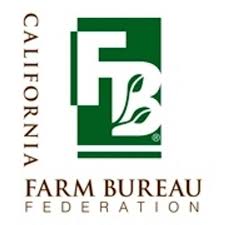 may also vote again on agricultural immigration legislation.
may also vote again on agricultural immigration legislation.The Senate passed its version of the farm bill last week, which will need to be reconciled with the bill passed earlier by the House. The farm bill establishes federal policy on programs affecting conservation, nutrition, commodities, trade, research, rural development and other topics.
California Farm Bureau Federation President Jamie Johansson said the bill represents "a five-year agreement between farmers and the American people," and that the Senate bill included many top priorities identified by CFBF.
"We will encourage our representatives to meld the best elements of the House and Senate bills to create a modern farm bill that serves farmers, ranchers, rural Americans and everyone who depends on the nation's agricultural production," Johansson said.
He said the measure also encourages research into mechanization, which offers a partial remedy for ongoing employee shortages on farms and ranches.
"This commitment to research acknowledges the need for long-term solutions for agricultural labor needs, and at the same time creates resources to develop innovative ways to harvest and care for crops," Johansson said.
"On the other hand, the bill isn't perfect," he added. "We would like to see an improved risk-management program for dairy farms and changes to eligibility requirements for conservation programs that would allow more California farmers and ranchers to participate. The federal government also needs to adjust its definition of the term 'rural,' so more California communities could qualify for programs to improve facilities in rural regions."
Josh Rolph, CFBF federal policy manager, said members of a conference committee will soon be selected to try to draft a compromise farm bill that both houses of Congress can accept and that President Trump will sign. He said he expects the conferees to work through July and August to resolve the differences between the two bills.
"Conferees will begin hammering out differences in coming weeks," Rolph said. "If things come to a standstill, they will likely extend the existing farm bill."
The current farm bill is scheduled to expire at the end of September.
One obvious sticking point for the conference committee, Rolph said, will be the Supplemental Nutrition Assistance Program, or SNAP. The House bill would strengthen work requirements for SNAP recipients. President Trump supports the provision, but it was not included in the Senate version of the bill.
"Nutrition is going to be the No. 1 area of contention," Rolph said.
On the farm-program side of the legislation, one contentious area for conferees is the Conservation Title, he said.
"Unlike in the Senate bill where the programs are kept separate, in the House bill, the conservation title bolsters the Environmental Quality Incentives Program by folding the Conservation Stewardship Program into it," he said. "We are in favor of a bolstered EQIP."
Both the House and Senate versions of the bill contain programs that would benefit California agriculture, Rolph said.
"We will continue to work closely with leadership and those on the conference committee to include programs beneficial to California before the final bill is sent to the president," he said.
Also last week, the House failed for a second time to pass immigration legislation.
Rolph said a third attempt could come sometime this month, and that the bill would address a visa program for agricultural employees and a mandatory E-Verify electronic eligibility system.
Johansson said California needs legislation that "addresses the realities of farming in our state," including a visa program for people who want to enter the United States legally to work on farms and ranches, and that helps current immigrant employees gain proper documentation.
(Christine Souza is an assistant editor of Ag Alert. She may be contacted at csouza@cfbf.com.)
Reprinted with permission: California Farm Bureau Federation








